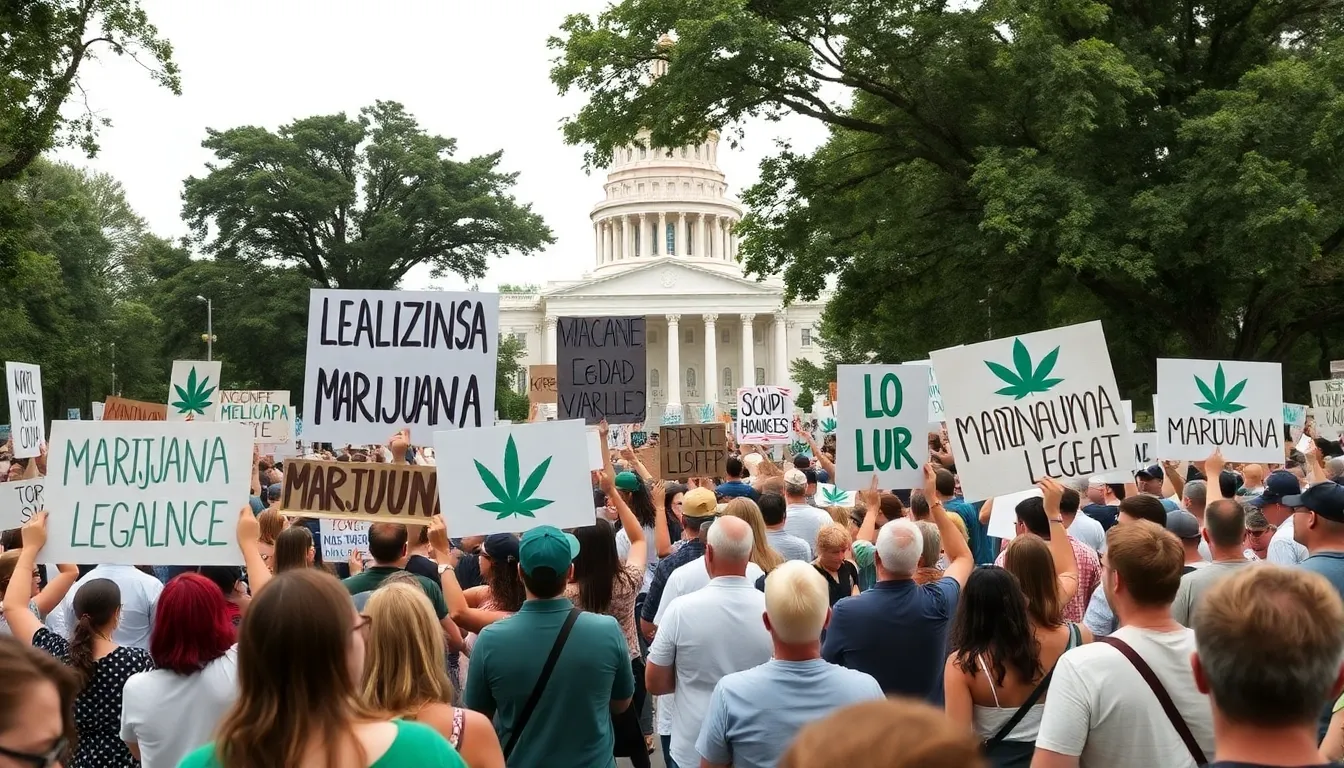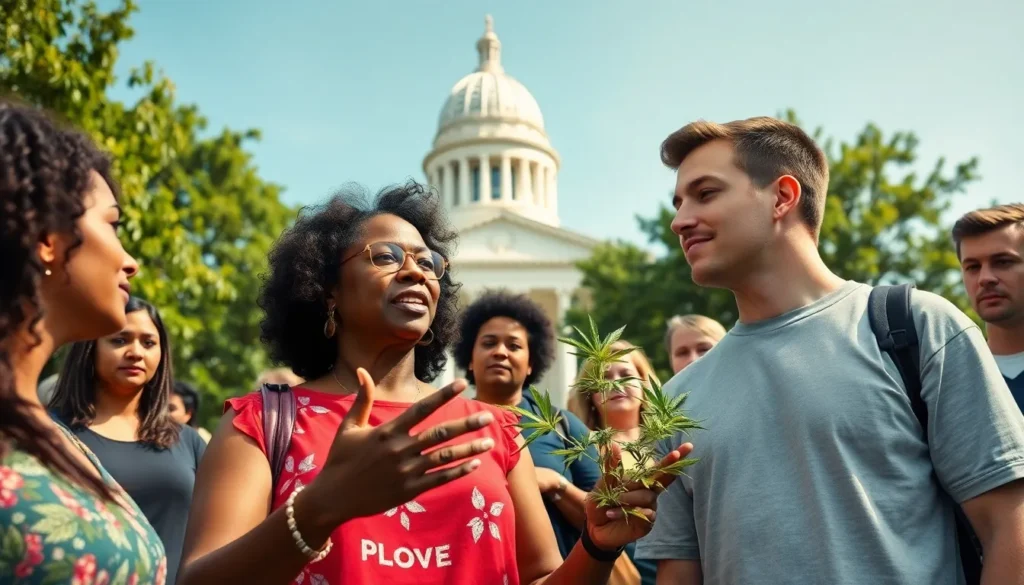South Carolina’s relationship with marijuana is like that awkward first date—full of uncertainty and a little bit of tension. While many states have embraced the green wave, South Carolina seems to be playing hard to get. Curious minds want to know: is it finally time for the Palmetto State to light up or is it still stuck in the past?
As discussions around legalization heat up, residents are left wondering whether they’ll soon be able to enjoy a little herbal remedy without looking over their shoulders. With a mix of humor and hope, let’s dive into the current state of marijuana laws in South Carolina and explore what the future might hold. Spoiler alert: it’s not as clear as a freshly rolled joint, but there’s definitely something brewing.
Table of Contents
ToggleOverview of Marijuana Legalization in SC
Marijuana legalization in South Carolina remains a contentious topic. Current laws classify marijuana as an illegal substance, which hampers access for medical and recreational users. Limited legislative progress occurred since the state has only legalized low-THC, high-CBD products for specific medical conditions. Patients suffering from epilepsy and other qualifying ailments can obtain a prescription for these products, but access is still restricted.
Many states have progressed toward full legalization, but South Carolina lags behind. Public opinion shows a growing desire for reform, with around 60% of residents supporting some level of legalization, according to recent polls. Despite this, political leaders have expressed caution regarding potential changes to the state’s marijuana laws.
Various bills have been proposed in recent years, yet none have passed both legislative chambers. Proposed regulations often include provisions for medical use, recreational access, and taxation. Each attempt at reform faces hurdles, including opposition from conservative lawmakers who cite concerns over public health.
Jurisdictions within South Carolina demonstrate varying approaches, with some cities decriminalizing small amounts of marijuana. Local policies allow law enforcement to issue citations instead of arresting individuals for minor offenses. Such steps indicate a shift in municipal attitudes, paving the way for potential future reforms.
Potential for change still exists within the political climate of South Carolina. Advocacy groups continue to push for comprehensive legislation, highlighting economic benefits and potential tax revenue. Discussions around marijuana reform indicate an evolving landscape, suggesting that South Carolina’s stance could change in the coming years.
Current Legal Status of Marijuana in SC

Marijuana remains illegal in South Carolina, except for specific low-THC, high-CBD medical products. Residents express growing support for reform, with approximately 60% favoring some legalization.
Medical Marijuana Laws
The state legalized low-THC, high-CBD cannabis products in 2014, specifically for treating epilepsy. Only patients meeting strict criteria can access medical marijuana as a treatment option. Additional bills advocating for broader medical use have been introduced, yet they struggle to gain traction in the legislature. Access remains limited, impacting the quality of life for many patients who could benefit from full medical marijuana legalization.
Recreational Marijuana Laws
Recreational use of marijuana continues to face resistance in South Carolina. No legal framework currently exists for personal use or possession of marijuana for recreational purposes. A small number of cities, however, have opted to decriminalize minor possession, reflecting changing local attitudes. Various proposals for recreational legalization have surfaced, but none passed into law, highlighting ongoing challenges in the political landscape.
Historical Context of Marijuana Laws in SC
South Carolina’s marijuana laws have evolved slowly over the years. In the early 20th century, cannabis was criminalized, mirroring national trends. The 1937 Marihuana Tax Act led to significant restrictions on marijuana, impacting its legal status for decades. By the 1970s, South Carolina enforced strict penalties for possession, reflecting the state’s tough-on-drugs stance.
A major shift occurred when the state legalized low-THC, high-CBD products in 2014, marking the first significant step toward medical marijuana. This legislation aimed to address severe medical conditions such as epilepsy, allowing limited access for patients with strict eligibility requirements. Despite this progress, access remains constrained, and many residents still seek broader medical marijuana options.
Public sentiment around marijuana has shifted notably. Recent surveys indicate that around 60% of South Carolinians support some level of legalization, highlighting a growing demand for reform. Activists and advocacy groups have worked tirelessly to press for legislation that allows for comprehensive medical and recreational use.
Political leaders, however, remain cautious. Continuous proposals for recreational marijuana legalization have emerged yet faced legislative hurdles. Local jurisdictions have started to decriminalize minor possession, suggesting a gradual change in public attitudes.
Challenges persist in navigating the complex political landscape. Resistance to recreational use remains strong, and leaders often cite concerns over public health and safety. Exploring potential economic benefits can influence future discussions, as advocates emphasize tax revenue as a compelling reason to consider legalization more seriously.
Recent Developments in Marijuana Legislation
Recent legislative movements in South Carolina reflect ongoing discussions around marijuana. Several proposals have emerged, aiming to expand medical use and introduce recreational legalization.
Legislative Proposals
Legislative proposals seek to adjust the current marijuana laws. Some bills aim to broaden access to medical marijuana, allowing more conditions for treatment. Others push for full recreational legalization, intending to create regulated markets. Despite public interest, many of these initiatives struggle to advance through the legislature. Limited success occurs mainly due to concerns from political leaders focused on public safety and health implications. Advocacy groups continue to push for these reforms, emphasizing potential economic benefits.
Public Opinion on Marijuana Legalization
Public opinion significantly influences discussions around marijuana laws. Surveys indicate that approximately 60% of South Carolinians support some form of legalization. Many residents believe cannabis could provide medical benefits, while others highlight economic opportunities such as job creation and tax revenue. As more people voice their support, local leaders feel increasing pressure to consider reform. Shifting attitudes are evident in cities that have begun to decriminalize minor possession, suggesting a growing acceptance. This evolving public sentiment could lay the groundwork for future legislative action.
The landscape of marijuana legalization in South Carolina remains intricate and evolving. While the state has made strides with the legalization of low-THC medical products, broader access continues to face hurdles. Growing public support for reform signals a shift in attitudes, yet political leaders remain cautious. As discussions around potential legislation progress, the future of marijuana in South Carolina could hinge on public opinion and local initiatives. The ongoing debates highlight the complexities of legalization and the potential for change in the coming years.






